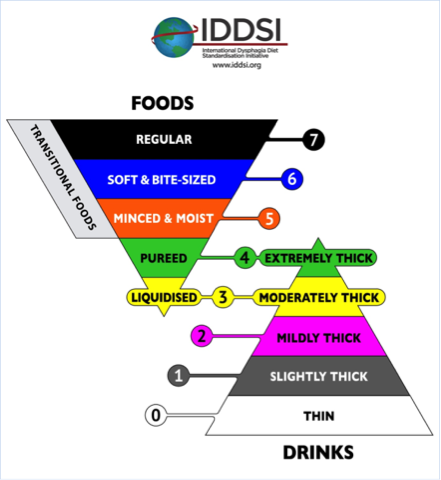How challenging is implementing the new IDDSI framework in your care home? (We’re sharing our industry expert’s advice to help you get it right.)
As June is National Dysphagia Awareness month, all month we are focussing on the different ways we can help and support you to achieve improved nutrition and hydration and a more dignified dining experience for the ladies and gents you support with Dysphagia.
This week we’re talking about all things IDDSI – the new International Dysphagia Diet Standardisation Initiative.
What is IDDSI?
The International Dysphagia Diet Standardisation Initiative (IDDSI) is a global standard published internationally with terminology and definitions to describe texture modified foods and thickened liquids used for individuals with dysphagia of all ages, in all care settings, and for all cultures..
The framework consists of a continuum of eight levels (0-7) and includes descriptors, testing methods and evidence for both drink thickness and food texture levels. IDDSI aims to improve clinical safety and efficiency by offering healthcare providers standardised terminology to assist in the development of international collaborative clinical research and to standardise the terminology and consistency of different food providers in order to reduce risks.

All care providers should now be aware of the new IDDSI system, which was implemented as from April 2019
How do you find out more about IDDSI?
The website www.iddsi.org offers comprehensive information about IDDSI. There will also be updates from the British Dietetic Association, The Royal College of Speech and Language Therapy and the companies producing commercial thickeners and texture modified meals will also be aware of any changes.
And there are loads of other resources available which include:
FAQ- these cover food and drink textures and the FAQ about bread is particularly interesting.
Print and display posters – these can be displayed in care areas, kitchens and in individual care plans Consumer handouts to explain each texture and also things to avoid
The Association of UK Dietitians have also published a really useful document:
IDDSI Frequently Asked Questions which is available for you to download here:
https://www.bda.uk.com/professional/practice/iddsi_frequently_asked_questions
Our care industry colleague and expert social care consultant and trainer Tim Dallinger of Social Care Consultants told us: ‘It seems that almost every time I undertake consultancy work with care providers that I need to make them aware of IDDSI and then train managers and staff.’
And Tim has shared his expert advice to care managers and providers below so that we can all work together to provide safer services.
Care providers must take action to ensure that:-
Care plans refer to IDDSI descriptors
All staff understand the IDDSI descriptors and how to ensure that food and drink is provided in a safe manner
All staff recognise the signs of dysphagia and know how to report and record this.
Advice is sought from specialists (SALT) whenever there is a risk of dysphagia
Care plans and risk assessments are consistent
The CQC refer to this issue in their “Learning from safety incidentsâ€- issue 6, this details a case study where a care plan was not updated to reflect the advice of dysphagia specialists leading to choking incidents.
If you have any questions relating to IDDSI or are coming across challenges implementing the new system and would like further guidance or training then please don’t hesitate to get in touch with us as at sales@hcsuk.co.uk or telephone us on 01773 713713. We have a great network of experts who can help you.
Here is another article we recently wrote around Dysphagia
Also you can request your FREE copy of our Dignified Dining Solutions Guide – to help people with a Dementia to eat better, which includes best practice advice and tips to help support your ladies and gents with Dysphagia to enjoy more independent and dignified mealtimes or visit our website to view our range of fit for purpose product solutions to help enable people living with Dysphagia.




